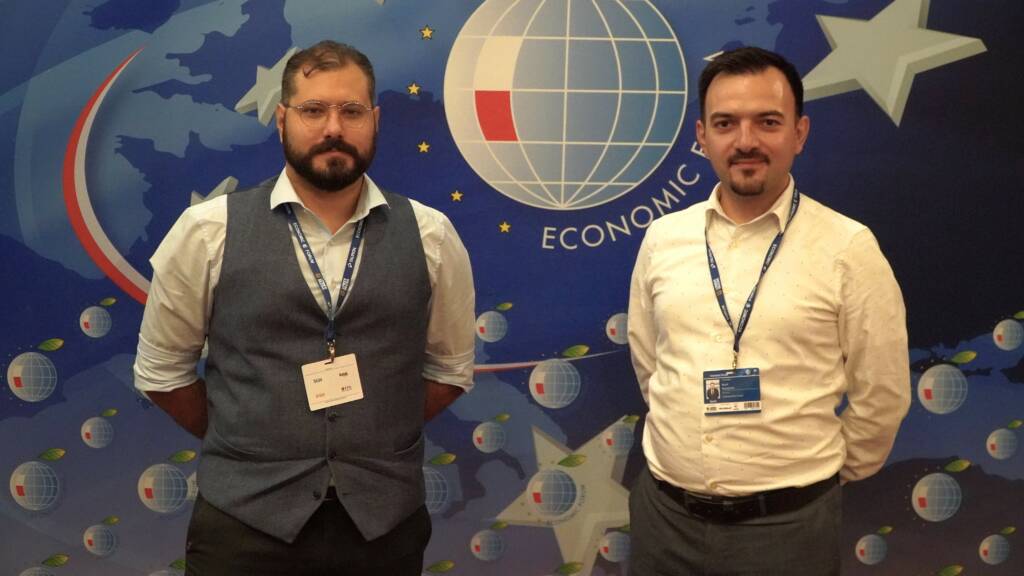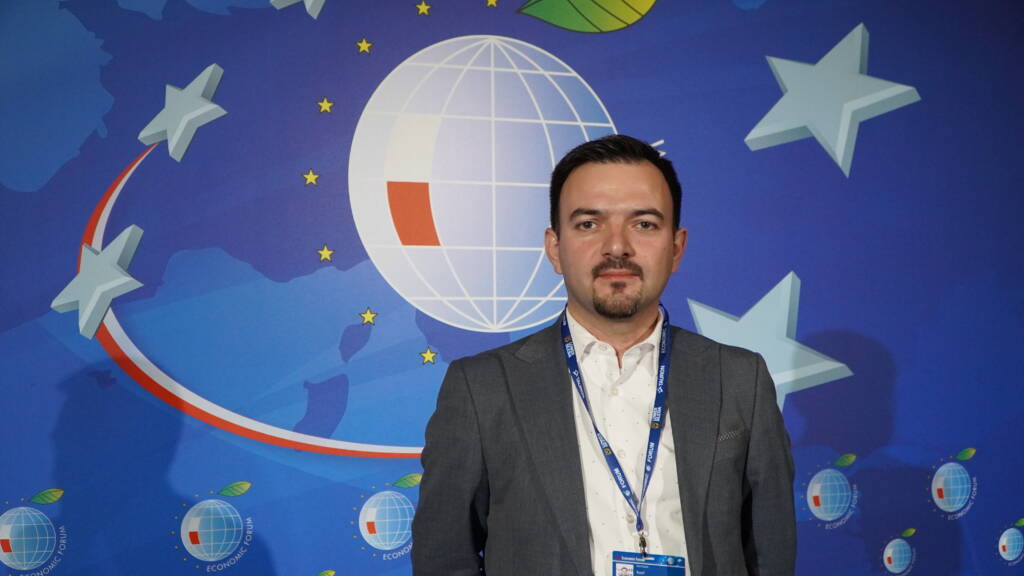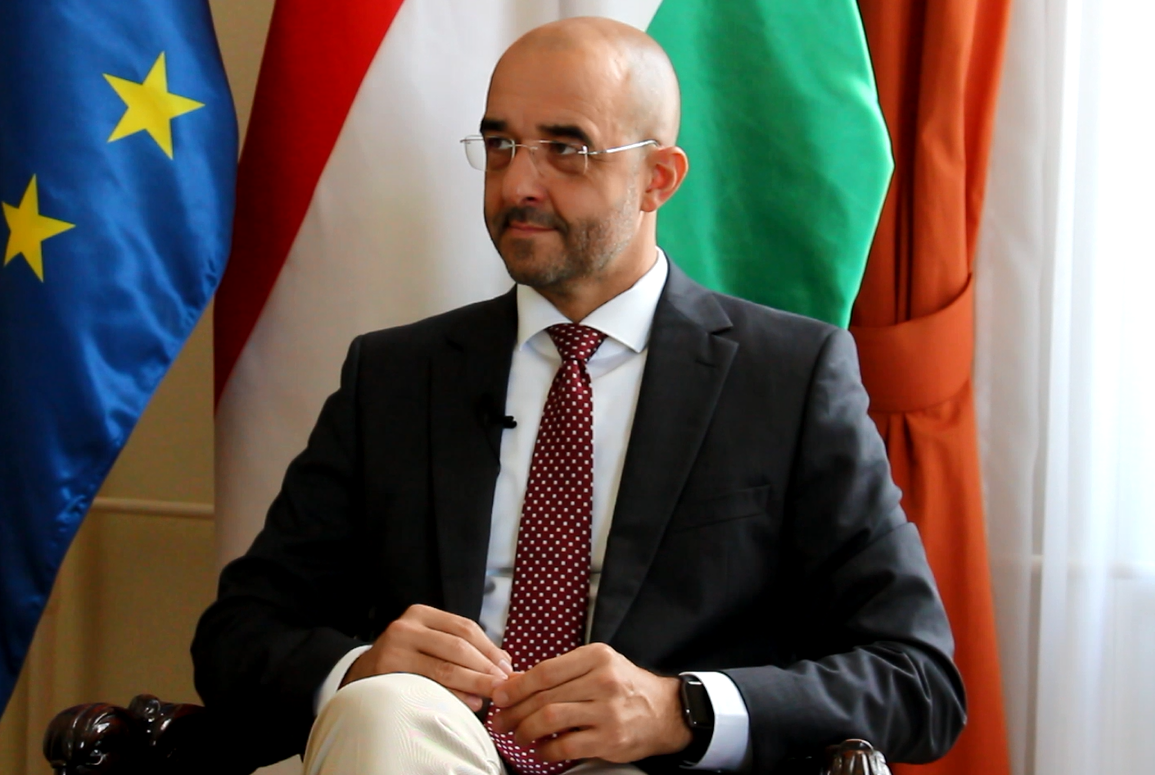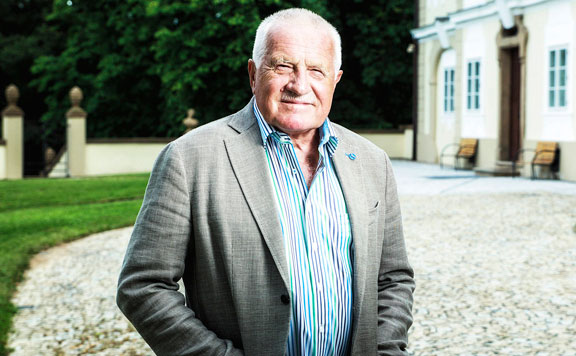Interview with Rusif Hüseynov, director and co-funder of the Topchubashov center, an Azerbaijani think tank based in Baku: “While other post-Soviet countries have been desperately seeking EU membership, the Azerbaijani side decided not to align itself with some power bloc in order not to irritate our northern neighbour. We have seen its consequences in Georgia and now in Ukraine.”
In Poland, at the 32nd Economic Forum, Ferenc Almássy met with Rusif Hüseynov, director of an Azerbaijani think-tank, willing to promote the national interests of Azerbaijan, and bringing to the attention of European citizens the point of view of this often disregarded country.
Meanwhile, there is an increasing interest towards Azerbaijan in Europe, especially since the beginning of the Russian so called “military special operation” in Ukraine that led European leaders to give up on Russian hydrocarbons – even though it is progressively done, and Russian oil and gas are still flowing to the European Union, the amount has dramatically diminished already.
In that context the European Union, and more specifically some member states, have increased their cooperation with Azerbaijan. Hungary, Romania, Austria, Italy, Bulgaria, Greece but also non-EU members such as Albania and Serbia, became important buyers of Azerbaijani resources.
For the Visegrád Post, Ferenc Almássy asked Rusif Hüseynov about Azerbaijan’s strategy regarding the European Union, its ongoing project regarding gas, oil, electricity and services export, and what it wants from the European Union.

Ferenc Almássy: Obviously the current situation is a profitable evolution for Azerbaijan. From your point of view, what consequences will it have for your country and what is to be expected regarding the development of bilateral cooperation? What is your strategy regarding Europe and the European Union?
Rusif Huseynov: Azerbaijan and the European Union have strong political and economic ties. The EU is Azerbaijan’s biggest trade partner, and up until the late 2000s Azerbaijan had been pursuing closer integration with the transatlantic family.
Although this policy was later changed in favour of the policy of balancing, Azerbaijan continued collaboration with the EU and individual EU member-states. According to President Aliyev of Azerbaijan, one third of the EU or nine countries are Baku’s strategic partners.
This includes countries such as Hungary, and Italy. This means that
Azerbaijan relies not only on Brussels, but also on various capitals when it comes to political, geopolitical, and economic decisions.
The EU is important for Azerbaijan in terms of geopolitics as well. Azerbaijan has been a member of the Eastern Partnership, although this project is now – let’s put it this way – in crisis, but for different reasons, because three of the Eastern Partnership countries are now heading towards a closer relationship with the EU. They are seeking membership. Belarus has suspended its participation. Armenia is in the Russian camp. So I guess we should reformat the Eastern Partnership, and hopefully during this reformatting or resetting, Azerbaijan will also play a constructive role.
Nowadays, Baku and Brussels have been negotiating a new framework. According to the officials who conduct these negotiations, 90% of the treaty is ready. There are several items which are being discussed, and once they are resolved, we will have a new treaty between Azerbaijan and the European Union.
The backbone of this whole collaboration between the two parties is energy security, or Azerbaijan’s role in the EU’s security architecture.
All Azerbaijani pipelines go westward and ship Azerbaijani oil and gas to the European markets.
Ferenc Almássy: We’re talking about the Trans Adriatic Pipeline, the South East Europe Pipeline…
Rusif Huseynov: We have the Baku-Tbilisi-Ceyhan oil pipeline, we have the Baku-Tbilisi-Ceyhan gas pipeline. All of them end in Turkish energy hubs, but the main clients are the European companies, so the products end up in the European markets. And I also mean the recent Southern Gas Corridor, which is a combination of TANAP, the Trans-Anatolian Pipeline, and TAP, the Trans Adriatic Pipeline. The Southern Gas Corridor replaced the Nabucco project, once a promising initiative, which had never been materialized.
The Southern Gas Corridor was Azerbaijan’s initiative. If I am not mistaken, back in the day when Azerbaijan was putting a lot of effort into realizing this whole initiative, there was a lot of scepticism, especially in the European capitals, and many stakeholders did not provide a sufficient amount of the investment in this mega-project. You also have to consider that it was a time when the EU countries were enjoying Russian oil and gas.
The situation has changed with the Russian invasion of Ukraine. In order to find a substitute for Russian gas, the EU structures, as well as individual EU member countries, decided to switch their attention to various suppliers. Azerbaijan is among the top suppliers which they have approached. Now there is more and more attention, more and more interest in these TAP and TANAP projects.
There is this myth – I don’t know who coined and circulated it – that Azerbaijan is claiming that it will replace the Russian gas supply at the European level. It’s not true. Azerbaijan does not have that capacity, and we actually never claimed we would be able to substitute fully for Russia. It’s impossible.
However, Azerbaijan is important because it is ready to – and can replace – Russian gas in several EU member countries and in countries which are located in the EU’s immediate neighbourhood.
I’m pointing to Italy, Croatia, Bulgaria, and Greece, as well as some of the western Balkan countries such as Albania. And there are now negotiations about extending the supply of Azerbaijani gas into new markets such as North Macedonia and Romania, and Hungary is also interested. So if Azerbaijan can somehow replace Russian gas in several European countries, it is already a big relief for Brussels.
Ferenc Almássy: Yes. Hungary, for example, is still heavily relying on Russian energy supplies but has to find a way out of this situation. I guess this is the reason why Azerbaijan is currently the best hope for Hungary to achieve this.
Just to go further on this topic, how are you working with the various EU member states, or non-member states from the Balkans? Was this a big change following the so-called “Special Military Operation”, or were you already working on diplomatic and trade agreements with these countries for years? What are you doing to develop your partnerships?
Rusif Huseynov: Before answering your next question, just a quick remark about the previous one. You referred to Hungary’s attempts to deal with Azerbaijan. When it comes to imports of gas, it’s not only about the amount of gas you receive. It’s also about diversity. The more diverse your suppliers are, the more secure you feel. This is why the European countries are trying to diversify their gas providers. I’m sure they are also talking with Qataris, with the Americans – trying to receive liquefied natural gas (LNG) from the different suppliers. This is important in terms of their security architecture, including energy security.
Now, back to your question about Azerbaijan’s foreign policy in the western Balkans, which I refer to as Azerbaijan’s pivot to the Balkans. For many years we were preoccupied with our own region, which is the Caucasus or the post-Soviet space. But now, due to the geopolitical changes,
Azerbaijan, whether it likes it or not, has to turn its attention both eastward, to Central Asia, and westward, to the Balkans and Central Europe.
When it comes to Central Asia, this is understandable, because the Middle Corridor has received a historic chance given that the traditional supply routes through Russia have been disrupted due to the current war. The Middle Corridor has a historic chance to substitute for the Russian route at some level – not fully, but at some level. So Azerbaijan, together with the Central Asian countries, is enthusiastic to play an important role in bridging East and West.
As for the western direction, again, whether we like it or not,
we have become a stakeholder in the Balkans because we are supplying gas to the Balkan countries through the Trans Adriatic Pipeline. It is Azerbaijan’s brainchild and we are becoming an actor in that region.
This is why Azerbaijan is quite active, and if you check the visits of Azerbaijani officials to the Balkan countries, they have intensified in the past few years. We are becoming a geopolitical actor in the western Balkans.
Just like its foreign policy vis-à-vis individual EU countries, Azerbaijan also approaches each Balkan country individually
and without putting all its eggs in the same basket. For instance, we have great relations with Serbia, and because there are energy issues, there are trade and construction ties, plus Azerbaijan and Serbia share the same concern over secession. We have never recognized Kosovo. The Serbians have never recognized the so-called Nagorno-Karabakh Republic. So there are some points of common interest.
We approach Croatia differently, individually. The same goes for Albania, Bosnia, or Greece, for instance. Azerbaijan and Turkey are the most important nations for each other when it comes to their foreign policy priorities. But at the same time, despite the Turkish-Greek problems, Azerbaijan tries never to irritate Athens and attempts to maintain positive relations, and this actually produces good results. This individual approach does work.
For instance, the most recent United Nations Security Council meeting was called at the initiative of the Armenian side because they wanted to adopt some anti-Azerbaijani resolution involving Karabakh. Azerbaijan tried to balance Armenia’s attempts, and one of our supporters at the UN Security Council was Albania. The Albanians favoured Azerbaijan’s position, and I think it’s due to the positive foreign policy that Azerbaijan is conducting in the Balkans.
Ferenc Almássy: What about Hungary, Romania, and Italy?
Rusif Huseynov: Italy is the first trade and export partner of Azerbaijan and has been as such for at least 20 years as the largest importer of Azerbaijani oil and gas. Azerbaijan is Italy’s largest trade partner among the countries of the South Caucasus. Azerbaijan accounts for more than 90% of Italy’s trade in this region.
While playing a neutral role in geopolitical developments in the Caucasus, Italy has always defended Azerbaijan’s territorial integrity and thus is considered a friendly and strategic partner by Baku. Currently, more than 100 Italian companies are operating in industry, construction, trade, agriculture, communication, services, and other fields in Azerbaijan. Several companies are also involved in the restoration and construction of the liberated Karabakh, which means a lot not just economically but also politically to the Azerbaijani side.
Romania is the second country in the world and the first among the EU member states to recognize the independence of Azerbaijan, when it did in December 1991. The two countries enjoy excellent political and diplomatic relations which were upgraded in 2009 to a Strategic Partnership. And again Romania became the first EU country in doing so with Azerbaijan.
Bucharest has always supported tighter EU/NATO relations with Baku, and advocated them. As for the most recent developments, earlier this year, Azerbaijan’s SOCAR and Romanian Romgaz signed an agreement, according to which Azerbaijan will provide 1 billion cubic meters of gas between in 2023-2024.
In case of Hungary, there are positive and growing relations at the level of the political elites, which push further political, economic and cultural ties. Among the most tangible forms of cooperation which I can quickly recall are the direct and cheaper Baku-Budapest flights, the Stipendium Hungaricum scholarship programme, which enable 200 Azerbaijani youngsters to get educated in Hungary annually.
We also welcome the Hungarian policy on and active involvement in the liberated Karabakh: there are discussions to engage some Hungarian firms in the mega-projects which are designed to revive this conflict-torn but beautiful region. Most recently, Magyar cities of Gyöngyös and Tiszavasvári became sister cities with the Azerbaijani towns of Şuşa and Ağdam from Karabakh. But more than this, Hungary enjoys enormous amount of soft power within Azerbaijani society, believe it or not.
Ferenc Almássy: How do you explain this?
Rusif Huseynov: The Azerbaijanis consider Hungarians to be fellow Turks. While some people including myself realize that the present-day Hungarians belong to another linguistic family, but this Hunnic heritage in Pannonia plays an important role in shaping Azerbaijani sentiments toward Magyarország.
Ferenc Almássy: That’s really interesting. So you’re saying that in Azerbaijan, this Turanism is really active in the population? It exists. It’s a real feeling.
Rusif Huseynov: It’s a real feeling, and it has an explanation, because during the 1990s, when the Azerbaijanis suffered from the Karabakh War, displacement, and ethnic cleansing, we needed allies. We needed some countries that could be close to us emotionally, linguistically, or historically.
Hungary therefore holds a special place in the Azerbaijani world-view.
This is why I believe that it is quite wise of Hungary to join the Organization of Turkic States. Again, the Hungarians are not linguistically within the Turkic family, but the presence of Magyars, who have also claimed the heritage of Turkic-speaking Huns, in the Turkic integrationist projects is quite symbolic and important.

Ferenc Almássy: We were talking about oil and gas, but it’s not only those that Azerbaijan provides to the EU, as Azerbaijan, in cooperation with Georgia, Romania, and Hungary, is about to set up the world’s longest underwater power line which aims to provide Europe with as much as one gigawatt of energy. It’s a huge project and a very ambitious one.
This will bring so-called “green energy,” because you have fields of offshore wind turbines in the Caspian Sea. Is this something that you did only for export to Europe? Is it something that has been motivated by the expectation that, as you said earlier, the European Union will be your biggest trade partner? Is it something that you are doing for market purposes? Or was this project something that you were already doing on your own? And is this energy being primarily produced for you or primarily for export?
Rusif Huseynov: For many years we could not focus on renewables, for obvious reasons. We had our own fossil-based resources being exported to Europe. But in the past few years, there has been much more attention given to renewable energy. I think
several new mega projects are being planned in Azerbaijan, mostly with Saudi and Emirati investors.
The Emirati-based Masdar, one of the world’s leading clean energy companies, has signed joint development agreements with the State Oil Company of the Republic of Azerbaijan (SOCAR), for onshore wind and solar projects, and integrated offshore wind and green hydrogen projects, with a total combined capacity of 4 gigawatts (GW). We cannot allocate our own money to this at present because nearly the biggest portion of our budget is now being spent on the restoration of Karabakh.
Since the war, it has been absorbing much of our energy and much of our budget. So we definitely need external funds for that, as well as expertise.
It’s been calculated that since Azerbaijan is a small market, and our domestic consumption demands can be met with only a small amount of electricity, gas, and oil, most of the energy that we will produce in the coming years will be available for exporting. So this project involving Azerbaijan, Georgia, the Black Sea, Romania, and Hungary is a very ambitious project. It of course has political and geopolitical dimensions. It brings together four countries in the South Caucasus and the EU, so I tend to see it more as a geopolitical project.
At the same time, I look forward to reading its feasibility report, because the economic dimension is important. It will be implemented if it’s economically viable. Hopefully, the parties which are now investing a lot of their reputations in this project will be able to make it viable for all the stakeholders involved. But if this project is successful, it will be another thing which unites not only Azerbaijan, but the whole South Caucasus with the European Union.
Ferenc Almássy: So that’s one more step towards linking Azerbaijan and the European Union. If it succeeds, should we then expect other projects of a similar nature?
Rusif Huseynov: Yes. For instance, the Digital Silk Way is an ambitious project implemented by Azerbaijani companies and aimed to connect Azerbaijan to the global internet network. The project envisages the implementation of big infrastructure projects, laying of terrestrial and subsea fibre optic backbone cables to form a digital corridor between Europe and Asia, as well as the construction of a regional Data Center in Azerbaijan and Georgia. This mega digital telecommunication corridor passing the territories of various countries, i.e. Georgia, Turkey, Azerbaijan, Kazakhstan, and Turkmenistan will be the most effective and shortest route with the high bandwidth and least latency in data transmission and boost the regional cooperation and development. We traditionally speak about oil and gas, but as you can see, new dimensions and new aspects of collaboration are also on the table.
Ferenc Almássy: This shows that there are more and more ties being built between the EU and Azerbaijan. This brings us to my next question. Europe will develop a bigger dependency on your energy and services, while you become more dependent on the EU as a client. So there will be a natural building up of interdependency. You know that the EU has a strong ideological way of handling its partners and neighbouring countries. It has led to a major crisis with Russia, among other things.
In this regard, how is Azerbaijan getting ready to face the inevitable pressures that will come from the EU for political normalization and societal changes according to EU standards?
Rusif Huseynov: As the 21st century brings us so many changes in such a quick mode, we have to reform ourselves, our country, and everything that surrounds us. In this context, changes and reforms are important and should be continuous. At the same time, I don’t want them just because the EU demands them. It should come from within and meet the domestic demands.
As for the EU and its treatment of its partner states, in Azerbaijan neither the political elite nor the community of experts has strong illusions. We have learned to live with the conditions of Realpolitik, if I can say so, because we are the only country that is sandwiched between Russia and Iran. So we have always been very pragmatic and realistic. And while other post-Soviet countries have been desperately seeking EU membership,
the Azerbaijani side decided not to align itself with some power bloc in order not to irritate our northern neighbour. We have seen its consequences in Georgia and now in Ukraine.
While other Eastern Partnership countries have signed relevant treaties with the EU, Azerbaijan has never hurried to sign and accept the conditions that might harm – let’s say domestic agriculture – despite the pressure from Brussels. This is because one of the stumbling blocks between Azerbaijan and the EU when it comes to this treaty or framework is agriculture, or subsidies in agriculture. So there are some issues in which Azerbaijan can firmly hold and defend its position.
Plus, as I said earlier, we have learned to live with a realistic approach, because we also have our own resentment towards the EU, since whenever Georgia, Ukraine, or Moldova were discussed at various EU levels, the territorial integrity of those countries was accepted without any hesitation or ambiguity. But
when it came to Karabakh or Azerbaijan’s integrity, we never heard unambiguous statements from the EU institutions. They would always call our situation “complicated.” This is why we are more or less immune to external pressures – and I’m talking not only about the EU, but also pressures from our immediate neighbours.
Ferenc Almássy: This brings us to my last question. You talked about the fact that you are stuck between two major geopolitical actors, namely Russia and Iran. You are also very close to Turkey, but you obviously have better relations with them. And while this is not the main point of the interview, there is a topic we cannot avoid – especially now that there has been a renewed conflict in Karabakh. What guarantees could you offer today to your European partners about remaining a long-term, trustworthy provider of energy in terms of the present situation, which seems to be long-lasting and not easy to resolve? Some also speak of the possibility of a bigger regional conflict. I hope it won’t happen, but the possibility cannot be dismissed. I also assume that this topic comes up in your discussions with your European partners. How do you answer them?
Rusif Huseynov: The answer is very simple. Azerbaijan has been consistent in its energy policy. 15 or 20 years ago, when we were building our first pipelines, they were directed westwards. They did not go to the north or the south. We have always kept our promises when it comes to energy exports to European countries. Remember that I told you earlier that when there was a lot of scepticism about this so-called Southern Gas Corridor, many Western stakeholders did not want to invest in it, but Azerbaijan used its own money to build a geopolitical infrastructure which the EU is now using with great pleasure.
Azerbaijan’s current geopolitical or economic strategy is based on the attempt to make our country a bridge state which would connect East and West through different projects: the Middle Corridor, connectivity in energy.
There is still some chance to involve Turkmenistan in exporting its gas to Europe. The probability of that happening is getting lower and lower, but there is still some chance. And as I said, Internet cables between East and West – the Digital Silk Way – are going through Azerbaijan. So we’re trying to become a bridge. Our previous energy projects had a long-term strategy, and this is still being followed. The political implications are huge.
Because of this consistent policy, I therefore think Azerbaijan has already proved itself to be a reliable partner. Right now we have some instability in our region because of the Armenia-Azerbaijan conflict, but I actually think the EU can play an important role as a mediator, offering its expertise and facilitation.
What Azerbaijan wants vis-à-vis Armenia is a mutual recognition of territorial integrity, including Karabakh as a part of Azerbaijan. Azerbaijan wants to unblock the transport and communication lines.
There has been an offer to Armenia regarding accepting them as part of the Middle Corridor.
The whole idea is to establish interdependency between Armenia and Azerbaijan in order to avoid new conflicts. The EU can be very helpful in this,
because the post-Second World War vision of the European family is based on this interdependency. So if the EU comes to our region with such expertise, with their good government standards, and with their money, I think we can solve our problems with Armenia, however deep they are.



